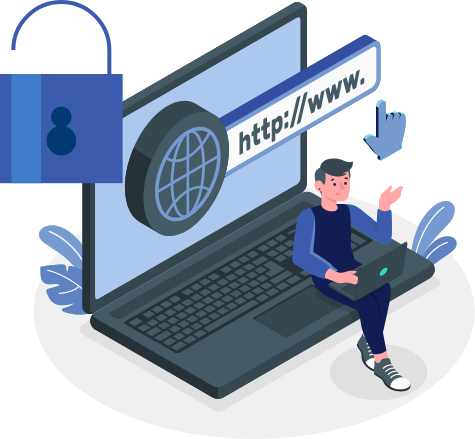-Brief explanation of VPN technology and its purpose
A VPN, or Virtual Private Network, is a private network that encrypts and transmits data while it travels from one place to another. A VPN client, on the user’s computer or mobile device connects to a VPN gateway on the company’s network. This gateway will typically require the device to authenticate its identity. It will then create a network link back to the device that allows it to reach internal network resources such as file servers, printers and intranets, as if it were on the same local network.
VPNs are used to create a private network over a public one. When a user connects to a VPN, all of their traffic is routed through the VPN server. This server encrypts the user’s traffic and routes it through a private tunnel to the internet. This way, the user’s traffic is private and secure, and the user can access the internet as if they were on a private network.
VPNs are often used by businesses to allow employees to work from home. By using a VPN, businesses can ensure that their data is private and secure, and that their employees are able to access the internet and the company’s internal network.
VPNs are also used by individuals to protect their privacy. By using a VPN, individuals can browse the internet and use applications without having to worry about their data being tracked or their activities being monitored.
-Mention the need for VPN advancements in the face of evolving online threats
As the online world continues to evolve, so do the threats that we face while we are online. One of the best ways to protect ourselves from these threats is to use a VPN, or Virtual Private Network. However, even VPNs need to evolve in order to keep up with the latest threats. In this blog post, we will take a look at some of the ways that VPNs need to evolve in order to keep us safe online.
One of the biggest threats to our online safety is data breaches. Every day, we hear about another company or organization that has had their data breached. This is often due to hackers who are able to exploit vulnerabilities in the system. When this happens, our personal information, such as our names, addresses, and even our credit card numbers, can be compromised.
A Best VPN can help to protect us from data breaches by encrypting our data. This means that even if a hacker does manage to get their hands on our data, they will not be able to read it. This is because they would need the encryption key in order to decrypt the data.
Another way that VPNs need to evolve is in the way that they handle our personal data. At the moment, many VPNs keep logs of our data. This means that they can see what websites we visit, what we download, and even our IP addresses. While this may not seem like a big deal, it can actually be quite dangerous.
If a VPN keeps logs of our data, then they could potentially hand this over to the government or law enforcement. This is especially true in countries where the government is not very transparent. In these countries, it is not uncommon for the government to request data from VPN providers in order to track down criminals or dissidents.
The final way that VPNs need to evolve is in the way that they are priced. At the moment, many VPNs are quite expensive. This is because they offer a lot of features and benefits. However, as more and more people start to use VPNs, the price will likely come down.
Overall, VPNs are a great way to protect ourselves online. However, they need to evolve in order to keep up
-Thesis statement: VPN 20 represents a new era in online security and privacy, revolutionizing the way we protect our digital lives
A thesis statement is a statement in an essay that the writer plans to support, discuss or prove. Not all of these statements can be empirically proven, but many of them represent an opinion that can be supported by evidence. In this case, the writer is claiming that VPNs are going to change the way we think about online security and privacy. This is a strong opinion that can be backed up with evidence.
There are many reasons why someone might want to use a VPN. VPNs can encrypt your traffic, so your ISP can’t see what you’re doing online. This is useful if you’re worried about your ISP selling your data to advertisers, or if you’re worried about governments spying on your online activity. VPNs can also help you get around censorship. If your government is blocking certain websites, you can use a VPN to access them.
VPNs are becoming more and more popular, as people become more aware of the importance of online privacy. A VPN is a great way to protect your privacy, but it’s not the only way. You should also use other security measures, such as a password manager and two-factor authentication.
Thesis statement VPN 20 represents a new era in online security and privacy revolutionizing the way we protect our digital lives.
I. The Current Landscape of VPN Technology
A VPN, or Virtual Private Network, is a technology that allows you to create a secure connection over a public network. This enables you to access your company’s network from anywhere in the world, as if you were physically connected to it.
VPNs have become increasingly popular in recent years, as more and more people look for ways to stay connected to their work and personal networks while on the go. However, the landscape of VPN technology is constantly changing, and it can be hard to keep up with the latest developments.
In ths blog post, we’ll take a look at the current landscape of VPN technology and some of the challenges that VPN users may face.
One of the biggest challenges facing VPN users is the increasing number of government and corporate restrictions on VPN use. In some countries, such as China, VPN use is outright banned. In others, such as the UAE, VPN use is heavily restricted.
This can make it difficult for VPN users to access the websites and services they need. It can also lead to increased security risks, as users may be tempted to use less secure VPNs or bypass VPN restrictions altogether.
Another challenge facing VPN users is the increasing number of malware and phishing attacks that target VPNs. These attacks can take advantage of vulnerabilities in VPN software or user error to gain access to sensitive data.
To protect against these attacks, it’s important to use a reputable VPN service and keep your software up to date. You should also be careful about which websites you access while connected to a VPN, as some websites may be infected with malware.
The landscape of VPN technology is constantly changing, and it can be difficult to keep up with the latest developments. However, by understanding the current landscape and taking steps to protect yourself, you can ensure that you’ll be able to stay connected and safe no matter where you are.
-Brief overview of how VPNs work
A VPN (virtual private network) is a technology that creates a private, secure network over a public one. VPNs mask your internet protocol (IP) address so your online activities are virtually untraceable. Most important, VPN services establish secure and encrypted connections to provide greater privacy than even a secured Wi-Fi hotspot.
Here’s a quick rundown of how VPNs work. When you connect to a VPN, you’re usually assigned a new IP address that represents you on the internet. This IP is supplied by your VPN provider and is different from your regular, public IP.
Now, when you visit a website or connect to any online service, that service will see your VPN IP address and not your real IP address. This has several benefits:
Your online activities are hidden from your ISP, government, and anyone else who might be snooping on your traffic.
Your location is also hidden. This can be used to get around geo-restrictions. For example, you can appear to be in a different country to access streaming services that would normally be unavailable.
Your traffic is encrypted, so even if someone is able to intercept it, they won’t be able to read it.
VPNs are a very popular way to ensure privacy and security online, and they’re also used to get around geo-restrictions. However, they do have some limitations.
They can slow down your internet connection, and they can be a little tricky to set up. Additionally, some free VPNs have been known to sell user data, so it’s important to be careful when choosing a VPN provider.
If you’re looking for a VPN to use, we recommend ExpressVPN. It’s easy to use, it has a no-logs policy, and it’s fast and reliable.
-Explanation of the different types of VPNs currently available
A VPN, or Virtual Private Network, is a secure tunnel between two or more devices. VPNs are used to protect private web traffic from snooping, interference, and censorship. There are many types of VPNs, and each has its own benefits and drawbacks.
PPTP: Point-to-Point Tunneling Protocol is the oldest and most popular type of VPN. PPTP is fast and easy to set up, but it is less secure than other types of VPNs.
L2TP/IPsec: Layer 2 Tunneling Protocol is a more secure option than PPTP, but it is slower and more difficult to set up.
OpenVPN: OpenVPN is a open-source software application that implements VPN techniques. OpenVPN is more secure and flexible than other VPN protocols, but it is more difficult to set up.
SSTP: Secure Socket Tunneling Protocol is a Microsoft protocol that is similar to OpenVPN. SSTP is more secure than PPTP and L2TP/IPsec, but it is only available on Windows.
IKEv2/IPsec: Internet Key Exchange version 2 is a secure protocol that is available on most devices. IKEv2 is more secure than PPTP, L2TP/IPsec, and SSTP, but it can be difficult to set up.
Wireguard: Wireguard is a new VPN protocol that is designed to be fast, secure, and easy to set up. Wireguard is available on most devices, but it is not as widely supported as other VPN protocols.
-Discussion of the limitations of current VPN technology
There are many different types of VPN available on the market today. The most common type is the IPsec VPN, which is supported by most routers and firewall appliances. However, there are a number of limitations with this type of VPN.
For example, IPsec VPNs can only be used with a limited number of protocols. This means that if you want to use a different protocol, such as L2TP, you will need to use a different type of VPN. Additionally, IPsec VPNs can be difficult to configure and troubleshoot.
Another type of VPN is the SSL VPN. This type of VPN is much easier to set up and use than an IPsec VPN. However, SSL VPNs have their own limitations. For example, they can only be used with a limited number of browsers. Additionally, SSL VPNs are not as secure as IPsec VPNs.
Finally, there are a number of other types of VPNs available on the market. These include PPTP, L2TP, and OpenVPN. Each of these types of VPNs has its own advantages and disadvantages.
As you can see, there are a number of different types of VPNs available on the market today. Each type of VPN has its own advantages and disadvantages. When choosing a VPN, you will need to decide which type of VPN is right for you.
II. The Need for VPN Advancements
Windows 10 has been out for a while now, and with it comes some great new features. One of these features is the Windows VPN. This new VPN allows you to connect to a private network, or even the internet, through a more secure connection.
The Windows VPN is a great advancement for those who need a more secure connection, or for those who want to connect to a private network. However, there are some drawbacks to using this new VPN.
One of the biggest drawbacks is that the Windows VPN is only available in certain countries. This means that if you are traveling outside of these countries, you will not be able to use your VPN.
Another drawback is that the Windows VPN is not compatible with all versions of Windows. This means that if you have an older version of Windows, you will not be able to use this VPN.
Overall, the Windows VPN is a great advancement for those who need a more secure connection. However, there are some drawbacks that you should be aware of before you use this VPN.
For more Articles Visit : https://www.abcbnews.com/




